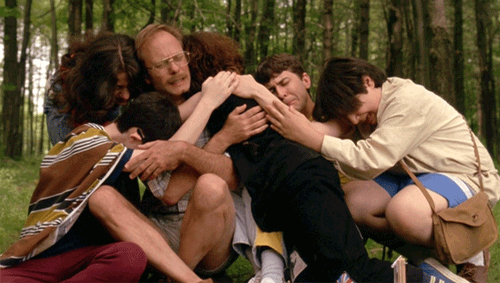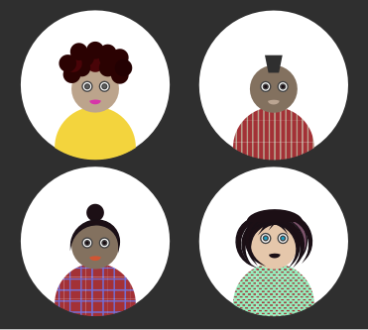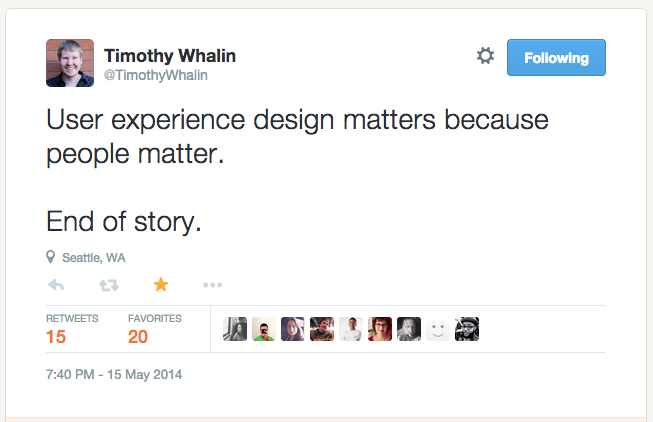
In User Experience we are fond of talking about empathy, but what does it really mean?
“Empathy is an important aspect of user-centered design (UCD) as it allows people being seen and understood from where they stand, not as test subjects but as persons with feelings”
Vanhuysse, S & Hall, L. (2004)
No one asks you to have empathy for your son or lover, we seem to do it anyway. Empathy doesn’t just come out of no where, it is founded on love and requires action, here are some that may help you increase your empathy.
Participate in User research as a User
While I was in University I took part in User research as a user (still do). The most memorable one was a Diary Study for a Scottish University. I had to sign into my specially created online diary and log my sleep habits daily. This ran for a couple of weeks, the incentive was £50 and a copy of the research findings. After the initial week, I got weary and bored. There wasn’t any update from the researchers (until the end ) and I frequently felt neglected, but still got to complete it because I like to finish what someone asks me to do.
As I began to conduct the interviews, research and studies on the job this experience became very useful. Knowing how I felt when I was a user helped me take better care with the people I meet for research, making sure they are comfortable if running an interview or usability study. I have made mistakes, made someone cry once but hopefully never again.
“We must remember that people live beyond our research and approach them with that in mind”
Antonia A.
With this experience you’d know what it’s like to be interviewed, recorded, prodded, you know where it hurts and where it makes you sing. This is standing in the user’s shoes.
Put up Personas on your wall

I’ve seen a number of articles which question the need for personas. I have questioned it myself because no one seemed to really ever use it, except as a deliverable. But it struck me one day how necessary it was to have them, empathy. I’m writing this as a reminder to myself as well because I don’t do enough of it.
We invest time in our relationships, we do things daily that affirm to the people we love that we love them, why do we think it will be any different to the one’s we design for?. What if you never had a note, a picture, the reality, of the person you are starting a relationship with, what kind of relationship will that be?
Personas help us connect to those we are designing for. Personas tell us the user’s story and stories engender empathy. Personas should be present when we have our daily or weekly catch up project meetings because like we do in Nigerian weddings sometimes, if the persons getting married cannot be present, they will be there in picture and spirit because the party must go on.
“Absence blots people out. We really have no absent friends ”
Ambrose Bierce
Some Useful Links on Personas
The Use of Comic Strips to Encourage Empathy in Design
Five approaches to creating lightweight personas
I’m keen to know what actions you take to help increase and strengthen empathy.
Stay Bright.

Ok I think I get your two points Toni,
1.We need to be mindful when researching someone.
Best to do the research on ourselves, at least to get a feeling of what the test environment is like
and if we find it an acceptable approach.
2.Mindful of who we are designing for using contact devices to remind us and keep them front and foremost in our minds.
It is interesting how you have included relationships as an example in this case.
Hey Desmond,
Thanks for simplifying my long post (I love stories a little too much) lol.
Succinct.
Do you do any research yourself?
No I would’t say that Toni, I needed the story to see the one liner, keep up the stories
Such a good perspective, thank you.
Hey Toni I just had lunch, (I am in Des Moines for a few months, gone from -20c last week to +25c today) and got to thinking that this might help explain what I meant by my “experimenting”.
For example this was probably one of your first cuts on these thoughts most likely an like most of us you needed and used stories to explain them. Technically you were using us (your users) to get some feedback on them. I was your guinea pig (willingly) for your thought sharing and I survived and feel on ill will towards you or anyone for sharing their untried thoughts.
So I guess that is why I can openly admit that I am experimenting too, as much on myself as anyone that reads or listens to what I say or think.
I would love 25c weather right now, enjoy.
The root word of experiment is, ‘to experience’ so in a way, we all are experimenting as we go through life.
Because we don’t know, we research. We’d like to validate, we research. We’d like to collaborate so we research. We’d like to further our ideas and concepts, we research.
We have to experience these things to learn, to know what path to take, to know if our intuition is to be trusted. Whether we experience things ourselves or by learning how others have done, each has merits.
I have no doubt that the experience of life calls for experimentation but we must also learn how to call it a day.
Ok I agree, I would love to call my experiments “a day” and i do usually for the day of a few days at least, ha!
But I can’t help myself as I a off on to my next thought excursion. Now if I was not making any progress then I think I would have quit 30 years ago but I seem to be getting closer to something only I am not sure what it is.
I have a feeling that this is a que to stop pestering you with my thought “experiences”.
This is my last question and I promise I will “call it a day”
What do you think of this statement:
“That anger is understandable but not acceptable”?
As simple as this statement sounds most people that I have asked seem to disagree with it.
.
Now, this is what I meant by calling it a day on experimenting. For example, I had been thinking about what I’ve written in the post, I’ve had those experiences. Calling it a day for me was about putting it out into the world, so that I have space to take on other experiments.
Also calling it a day, as designer is knowing when to say, ok, we have a lot of ideas, we have done a lot of research, this is the path we are going to pool all our resources to execute. If something changes down the line, fine, we will adapt and if we can’t, start from scratch, but this is what we are doing to do now.
We can all think and bluesky all day long for eternity, but if we want to be useful in reality we must know when to call ‘day!’ on our experimentations.
Now to your question, I agree, anger can burn whatever it comes in contact with, and like fire, the longer it burns, the harder it is to control and the more damage it does. It’s understandable because it’s part of the human spectrum of emotions, but it must always give way, fast, to something higher, noble, love or a passion to right wrongs.
It is unacceptable to continue in anger, because you not only burn yourself up, you spread the flame to others around you. I’m someone that picks up people’s feelings quite easily, I don’t like being around anger, because it makes me uncomfortable and tense without it being directed at me, not healthy at all. So I get your sentiments.
“Do not make friends with a hot-tempered person, do not associate with one easily angered” Prov 22:24
Whew! that’s a relief Toni, I am so used to people suggesting I “call it a day”, ha!
For years I have been told in various ways to stop thinking too much. and for years I reacted until recently I came up with what I consider a good response. I now say:
“I agree, I either think too much or not enough but we can be assured i am not thinking the perfect amount!”
This type of thinking can be used in so many ways, I love it. ie “you over analyse…” etc.
I can now agree with everyone and anyone on my inadequacies and I try not to throw stones.
But I digress.
Yes I agree there is a saying in startups about if you are shipping a product that you are not embarrassed about then you are shipping too late. Once again this thinking comes in where we are never going to ship perfectly on time, so better to be too early than too late.
I also like the thought of either over estimating someone or underestimating someone. I prefer to overestimate them. Occasionally I get a surprise, but mostly I get what you said you get that I am weird.
It is nice that you think that about anger. This is one of two fundamental questions I ask to “research”
how suited I might be to someone. The other one is what we consider an “agreement” means.
Like what is the difference between an agreement and a promise. Without trying to test you I will just tell you what my brother and I have agreed on. An agreement takes two people and a promise only takes one. An agreement is made up of two promise (at least), for now.
Well…something like that. I think I value the agreement more than the sum of the promises that make it up.
Oh one last question on anger, a lot of christians seem to justify their anger by calling it “righteous indignation”. Any thoughts?
Don’t get me wrong, people can and should get angry but for the right things and with the right motivation. As I wrote earlier, anger must give way, fast, to something noble like compassion or love, if it heads to revenge, conflict, bodily harms etc that’s unacceptable and the longer anger is held the more likely it becomes those things.
Anger should be a signal flare not a consuming fire.
Hmm interesting and worth pondering but I am of a different view at present Toni.
I think that my anger is unacceptable for others to need to or have to put up with, and I certainly find other peoples anger is unacceptable for me to put up with.
If I get angry I would simply apologise for my poor behaviour, especially when agreed upon before hand.
I understand that we can and will get angry, most likely, but I simply find it unacceptable and an error in the scheme of things when there are so many other ways that we can approach an issue when we have a problem with it. ie get agreements upfront how we will deal with issues before they become a problem is my favorite. A bit like designing a UX before the customer sends us email about their confusion. Proactive rather than reactive.
In that way it makes me the antichrist for any christians that espouse to the benefits of anger on any level, sorry. In the story of jesus and his angry rant in the temple I would tell him the same thing and get an agreement with him on how we would proceed if he wanted me to be his friend. Sorry jesus find someone else to bother with your tantrums!
That is fairly simple to see how I differ from how christians that perceive him n that way, and perhaps
he would agree with me and apologise for his poor behaviour. But that is just me, I am of another faith, perhaps.
A slight update on my thinking, I believe that anger is understandable but not acceptable, without an acceptable apology. By forming such an agreement, upfront, with someone, also sets up a buddy to assist us giving the apologies and helping to reduce our anger instances, I believe.